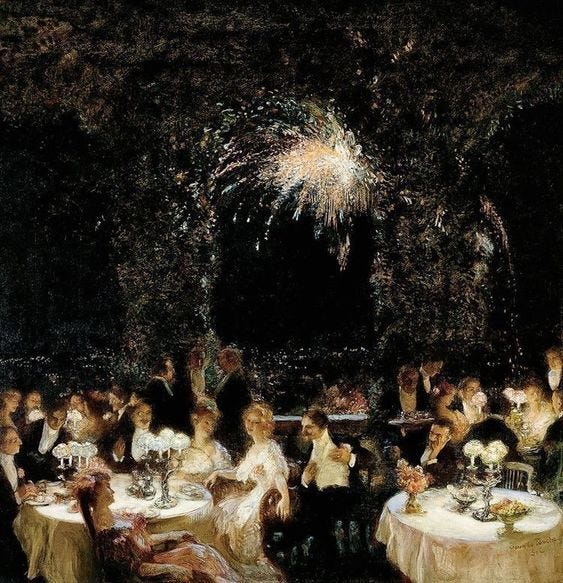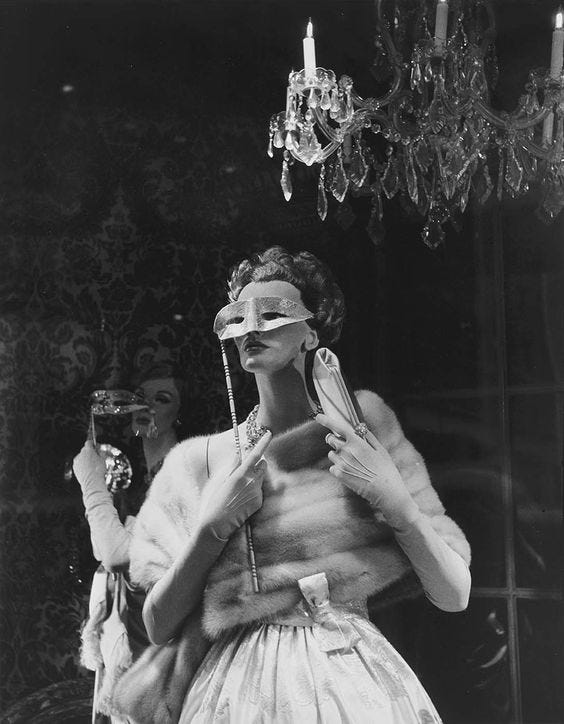Like ‘Daisy’s murmur’, the effect of Fitzgerald’s style ‘make[s] people lean [forward]’, eager to catch something imperceptible, a fulfilment to something half-heard, ‘a whispered “Listen”, a promise of something more (16).
On reading F. Scott Fitzgerald’s The Great Gatsby (1925) once again, I couldn’t help but notice a kind of non-committal, exploratory style of writing that came through on just about every page. So many of the character interactions seem coloured by a spirit of playful questioning, especially in the first half of the short novel. Of course, this ease of personality shines through partly as an effect of the characters inherited wealth, and there is a kind of helpless, lazy charm often associated with old-money lifestyle. But there is a deeper element in this style of writing that goes beyond a mere contextual aid to the portrayal of upper-class psychology. As a result, throughout the narrative, Truth, or the reality behind appearances, is often half-discovered, hinted at, never uncovered in its fullness. And after all I am left to wonder whether one may learn more about oneself and the world if one sought to ask more questions about a text, rather than confine oneself into always seeking the right paths, the right answers.
In The Great Gatsby, Fitzgerald depicts the revelry and abandon of the Jazz Age in 1920s New York, Long Island. Throughout, there are gestures toward the truth of things, whether of the true import of a character’s interiority, or of the big questions of life, though these gestures are never fully developed. Jay Gatsby, with his ‘heightened sensitivity’ to life, could only ‘[stretch] out his arms’ toward that ‘single green light’ by the docks across the water, never attaining its true essence, the totality of its light, in his hands (Fitzgerald, 27). Although this ‘single green light’ (27), in its immediate context represents Gatsby’s unfulfilled desire towards Daisy, it is his at-once ‘trembling’, at-once sure-footed stance upon the grass, coupled with his neighbour, Nick Carraway’s gaze of quiet bewilderment as he looks on from a distance, that is perhaps a hint towards a deeper meaning. It cannot simply be that Gatsby is grasping, dramatically, for this green light across the bay solely because of his desire for Daisy, in and of herself. So often in human psychology there is a deeper and unfulfilled part of ourselves that is yearning to be satiated, and people, things, or ideas can become placeholders for this desire. Of course, Gatsby does indeed love Daisy, but he has invested a great deal of this love into an idea of her, of what having her would represent, of how he might feel in the future if his desires were met. As the narrator, in the voice of Nick Carraway, explains:
[...] he wanted to recover something, some idea of himself perhaps, that had gone into loving Daisy. His life had been confused and disordered since then, but if he could once return to a certain starting place and go over it all slowly, he could find out what that thing was.
Interestingly, Gatsby’s desire for Daisy is really a desire for something in himself, for an idealised version of how things should be in his inner life. As such, his relationship with her falls apart, and any romantic sojourn the two have is short-lived, though bright and passionate.
Another literary thread that I was delighted to find upon a second reading was that Fitzgerald seems to have imbued the story with an ‘aura of myth’, with such mythic language used to ‘deliberately…contribute to the God-like image of Gatsby’ (Pearson, 640). In one instance, Gatsby is described as a ‘son of God’ about ‘His Father’s Business’ (Fitzgerald, 94), paraphrasing Jesus in Luke 2:49. Taking a keen interest in the stars, Gatsby apparently had a ‘share’ of the ‘local heavens’ (26), like some wise astrologer, or sage of old. Indeed, as Christ had a habit of disappearing from before the eyes of his disciples (Luke 24:32 NRSV), so too, as Nick watches the trembling Gatsby from his front yard, the mysterious protagonist disappears from beneath the glittering cosmos, leaving Nick alone in an ‘unquiet darkness’ (27). Although the two men, at this point in the novel, had never formally met, Gatsby’s absence in this moment is nevertheless deeply felt. The supernatural resonance should not go unnoticed: Gatsby ‘has come and gone as an apparition’ (Pearson, 640-641). Exactly why Fitzgerald should surround Gatsby with this kind of divinised language is unclear, but as readers we are impelled to know more about what makes this man so unique and alluring, and why it is that his reputation appears charged with all the signs of exceptionalism and grandeur.
Like ‘Daisy’s murmur’, which had a particular effect upon Carraway as the two talked languidly at the Buchanan mansion, the effect of Fitzgerald’s style ‘make[s] people lean [forward]’, eager to catch something imperceptible, a fulfilment to something half-heard, ‘a whispered “Listen”, a promise of something more (16). Such narrative construction, coupled with the temperamentally aloof nature of much of Fitzgerald’s characters, renders the role of the interpreter difficult, if one approaches the text with an intent to find extant a sole or primary meaning. Like Gatsby’s epiphany at novel’s end, any lasting sense of meaning derived from the book is exploratory, half-understood—‘breathing dreams like air’, lazily scattered, ‘drift[ing] fortuitously about (151). At least, that is my impression of coming back to this work, and I am glad to have taken away some new impressions, to think about some new approaches to literary texts and even to life itself. Fitzgerald, through his presentation of enigmatic characters, and his refusal to explore too finely upon their interiority, in many ways provides a model for the modern novel. Questions are asked, though not necessarily answered.

Works Cited:
Pearson, Roger L. “Gatsby: False Prophet of the American Dream.” The English Journal, vol. 59, no. 5, 1970, pp. 638–45. JSTOR,
Scott, F. Fitzgerald. “The Great Gatsby”. Transatlantic Press, Amersham, 2012.








The rich are indeed different from you and me.